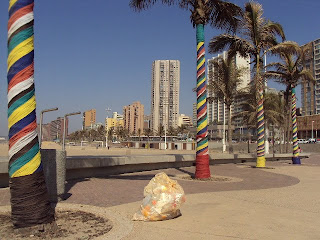The beach in Durban where the FIFA Fan Fest was set up just six weeks ago.
It's been eleven days since I've worked at St. Leo's. In that time, which started out as a Friday I'd wanted to take off to spend time with Becky in Cape Town, all public servants in South Africa are on strike. Government schools (and some private ones) are closed, as are government hospitals and most clinics. The sick can't get treatment, and more importantly, those with HIV/AIDS and tuberculosis who depend on regularly scheduled medicine have no access to their prescriptions. Children enrolled in government schools sit at home or at a relative's house, bored out of their minds, because their families cannot afford to send them to private school in the first place. Sadly, many of these kids depend on their biggest meal of the day coming from the school kitchen, and they will go hungry unless they find aid elsewhere.
Themba is in hospital with a stomach ulcer and other complications, and when Becca and I went to see her today, she told us that she'd had a phone call from Smangele Khumalo, a learner in Grade 5. All Smangele told Themba was that she was very hungry; Themba did her best to convince her that the strike would end soon, then hung up the phone and cried for the rest of the night. We also spoke about how fortunate Themba is to be able to afford care in a private hospital-- otherwise her ulcer would go untreated and the fibroids they found would have gone unnoticed.
I've been talking a lot with people, both in South Africa and at home, about everything going on, and the general consensus is that the issues causing this strike are so deeply rooted in South Africa's turbulent and segregated history that it's really hard to be hopeful about the outcome. There has been very little said on the government's part, and the president is no better; Jacob Zuma's latest announcement was that he had attended the highly anticipated Springboks/All Blacks rugby match in Soweto last Saturday with his cabinet members. For people who suffered through centuries of being powerless to now have as much influence as they can get is a recipe for disaster (see: Julius Malema, and also the ANC's recent announcement to enact a media tribunal on all journalistic coverage of government policies and activity).
And the poor of South Africa cannot win. Those who wish for higher salaries are using the only advantage they have-- their ability to work-- to change the minds of those they elected to power in the first place. And those affected by the strike are equally annoyed at the government. The ANC was elected to power in 2009 by the very people it is now turning its back on. The blame game turns into an endless cat-and-mouse chase with lots of pointed fingers and not much progress.
But no matter who is to blame, the fact of the matter is that people are starving, children cannot attend school, and the sick will die without access to proper treatment and medication. The results from matriculation exams (the equivalent of the Leaving Cert, GCSE, or other final exams to graduate high school) in this country were already abysmal, and now with exams so close, there is a very good chance that South Africa's meager 15% pass rate will dip even lower.
And all this in a country that just six short weeks ago played host to one of the most widely-viewed sporting competitions in the world. In Durban alone, trillions of rand were poured into the construction of a beautiful airport and magnificent stadium, as well as the complete and much-needed renovation of the Golden Mile along the beach front downtown. People were hired as "beach guards" to look after worried tourists' buckets and spades while they took a dip in the balmy Indian Ocean. Peace Officers strolled along the road with municipal police to keep people's minds at ease. In the fan parks, people gathered in the warm Durban winter to watch soccer together, regardless of nationality, race, economic status, or age.
But now it's over, and garbage collects on the beach while police officers busy themselves with forcing the homeless off benches along the promenade. Now that the strike is in full force, they've been dispatched to places like Addington Hospital in the city, where they were forced to fire rubber bullets into a crowd of protesters. Parents of some of the learners at St. Leo and elsewhere have lost their jobs, and the scar that runs so deeply in this achingly beautiful country cannot be covered up any longer.
In one of Durban's newspapers called The Mercury, a piece by someone named Danie Joubert was published in yesterday's Opinions section. Though the column was striking in many ways, this passage in particular stood out to me:
It is obvious we have our social investment priorities wrong. We can convince ourselves to spend hundreds of billions on sports stadiums and infrastructure that had a one-month emotional impact and a limited future utilisation return value, but we cannot convince ourselves to invest the seed capital in human capital formation that assures future harmony and prosperity for a nation.
I can only hope that some sort of agreement can be reached, and soon. With the lives and well-being of the poor, especially children and the sick, at stake, a resolution needs to happen before things get any worse.
.


Just catching up with your blog Sinead....great stuff....love reading what you have to say....Thinking of you and hoping that all goes well for that last few months.......xooxox Ruth
ReplyDelete